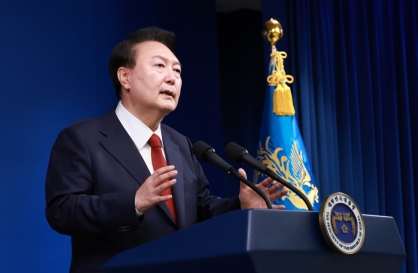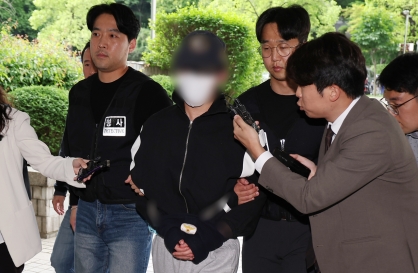The meaning of happiness in our children’s education
By Korea HeraldPublished : July 31, 2013 - 19:25
A friend of mine told me one day that there has been an increase in the number of students, ranging from elementary to high school, who have been paying visits to child psychiatrists. Completely appalled by this news, I researched deeper to find that the number of students visiting professionals for mental treatment within the last two years has tripled and approximately 14.8 percent of the total student population in Korea is relying on professional assistance, according to the research done by the Ministry of Education.
Obviously, I’ve had somewhat different experiences with education, being a mom from abroad. So, when I first arrived in Korea, the education shock was greater than the culture shock. Seeing how a majority of Korean moms avidly dedicate themselves to their children’s education, I felt as though I was ignorant in not knowing what’s best for my child.
I became a mother at the age of 40, and as any mother would say, my little boy is the “love of my life.” I even thought about returning to the United States when he is ready to begin primary education due to my own insecurity that I might follow the footsteps of others in Korea.
During my extended stay in Korea, I saw Korean students struggling to create the perfect portfolio composed of academic excellence, extensive experience, and various other requirements for standardized “specs.”
Mothers are normally the ones who know their child the best. But at times, external sources manipulate mothers to carry on the values set by society ― irrespective of the potential in each child. Short of mutual understanding and connections, standardized tests and social paradigm slowly filled the gap with a deceitful belief that the specs will eventually pay off.
The education students learn from schools or institutions is important. However, I’m a firm believer that internal connection and emotional support from home are even more essential. Korean parents are taught to expect outstanding results by heavily relying on external support, such as English kindergartens, private tutoring and institutes.
Unfortunately, these cannot be the main sources for well-rounded development for a child.
As experienced educators would advise, prioritizing and valuing students’ internal learning and development are as equally important as certain academic records ― allowing opportunities for various engagements. Although Korean mothers hope for more diverse learning, they often succumb to what society expects. Take volunteering as an example. Korean students often engage in volunteering just for the certificate and oftentimes the moms encourage such outcome.
If mothers want their child to experience diverse education and life lessons, they will have to choose the proper type of involvement and encourage students in such direction. In the case of many foreign countries, such as the U.S. and European nations, parents are committed to their children’s school life in any way possible. Parents volunteer to be the coach for an athletic team, or participate in fund-raising events and various other activities that do not have anything to do with academic achievement.
Mothers don’t line up in front of the schools like a personal driver, but try to facilitate confidence and true emotional growth on the road to independence through such commitment. Through this, the children can naturally share common values and life lessons with their parents, which will pay off in the future as a great asset.
Fortunately, recent interest in global education for Korean mothers has become a turning point. As someone who has been fortunate enough to work at one of the international schools in Korea, I have an opportunity to participate and witness how students at the school are being educated and how the school interacts with the parents as well. At the school, both parents and students are able to find the value of education while being fully immersed in various opportunities. Wide ranges of programs allow parents to have hands-on experiences to closely learn and see their children’s strengths and weaknesses. I attended a student-led conference to translate for the parents, where the students researched their own findings from an extensive array of topics available to them, from volcanoes to earthquakes, and present it in front of the parents.
The parents also had the opportunity to participate in a math class and were able to lead the students to realize that math is a fun subject to learn using unique learning tools such as playing cards without thinking he or she is learning the “probability” in math. Ultimately, the parents were very content with these observational periods and have come to realize that these opportunities are more than simple observations, but a time for them to realize the child’s interests and how the child’s perception can change.
Fundamentally, these opportunities allowed everyone including me to make a mutual connection and to acquire clearer ideas about how to guide our children for diverse learning and eventually, a happier life. Surely enough, driving the child for more studying after school isn’t one of them.
One very important focal point is that every child should be happy as they realize their own needs. After all, don’t we all want our children to know what they are capable of and yet be happy? As parents we are vaguely learning the concept of “whole-child education.” Realizing its true meaning, I hope parents and children can learn how to work together, in order to move forward for overall growth and become “happy” learners.
By Helen Lee
Helen Lee is a director of communications at Chadwick International located in Songdo, Incheon. ― Ed.
Obviously, I’ve had somewhat different experiences with education, being a mom from abroad. So, when I first arrived in Korea, the education shock was greater than the culture shock. Seeing how a majority of Korean moms avidly dedicate themselves to their children’s education, I felt as though I was ignorant in not knowing what’s best for my child.
I became a mother at the age of 40, and as any mother would say, my little boy is the “love of my life.” I even thought about returning to the United States when he is ready to begin primary education due to my own insecurity that I might follow the footsteps of others in Korea.
During my extended stay in Korea, I saw Korean students struggling to create the perfect portfolio composed of academic excellence, extensive experience, and various other requirements for standardized “specs.”
Mothers are normally the ones who know their child the best. But at times, external sources manipulate mothers to carry on the values set by society ― irrespective of the potential in each child. Short of mutual understanding and connections, standardized tests and social paradigm slowly filled the gap with a deceitful belief that the specs will eventually pay off.
The education students learn from schools or institutions is important. However, I’m a firm believer that internal connection and emotional support from home are even more essential. Korean parents are taught to expect outstanding results by heavily relying on external support, such as English kindergartens, private tutoring and institutes.
Unfortunately, these cannot be the main sources for well-rounded development for a child.
As experienced educators would advise, prioritizing and valuing students’ internal learning and development are as equally important as certain academic records ― allowing opportunities for various engagements. Although Korean mothers hope for more diverse learning, they often succumb to what society expects. Take volunteering as an example. Korean students often engage in volunteering just for the certificate and oftentimes the moms encourage such outcome.
If mothers want their child to experience diverse education and life lessons, they will have to choose the proper type of involvement and encourage students in such direction. In the case of many foreign countries, such as the U.S. and European nations, parents are committed to their children’s school life in any way possible. Parents volunteer to be the coach for an athletic team, or participate in fund-raising events and various other activities that do not have anything to do with academic achievement.
Mothers don’t line up in front of the schools like a personal driver, but try to facilitate confidence and true emotional growth on the road to independence through such commitment. Through this, the children can naturally share common values and life lessons with their parents, which will pay off in the future as a great asset.
Fortunately, recent interest in global education for Korean mothers has become a turning point. As someone who has been fortunate enough to work at one of the international schools in Korea, I have an opportunity to participate and witness how students at the school are being educated and how the school interacts with the parents as well. At the school, both parents and students are able to find the value of education while being fully immersed in various opportunities. Wide ranges of programs allow parents to have hands-on experiences to closely learn and see their children’s strengths and weaknesses. I attended a student-led conference to translate for the parents, where the students researched their own findings from an extensive array of topics available to them, from volcanoes to earthquakes, and present it in front of the parents.
The parents also had the opportunity to participate in a math class and were able to lead the students to realize that math is a fun subject to learn using unique learning tools such as playing cards without thinking he or she is learning the “probability” in math. Ultimately, the parents were very content with these observational periods and have come to realize that these opportunities are more than simple observations, but a time for them to realize the child’s interests and how the child’s perception can change.
Fundamentally, these opportunities allowed everyone including me to make a mutual connection and to acquire clearer ideas about how to guide our children for diverse learning and eventually, a happier life. Surely enough, driving the child for more studying after school isn’t one of them.
One very important focal point is that every child should be happy as they realize their own needs. After all, don’t we all want our children to know what they are capable of and yet be happy? As parents we are vaguely learning the concept of “whole-child education.” Realizing its true meaning, I hope parents and children can learn how to work together, in order to move forward for overall growth and become “happy” learners.
By Helen Lee
Helen Lee is a director of communications at Chadwick International located in Songdo, Incheon. ― Ed.
-
Articles by Korea Herald









![[K-pop’s dilemma] Time, profit pressures work against originality](http://res.heraldm.com/phpwas/restmb_idxmake.php?idx=644&simg=/content/image/2024/05/08/20240508050705_0.jpg&u=20240508171126)









![[Today’s K-pop] Stray Kids to drop new album in July: report](http://res.heraldm.com/phpwas/restmb_idxmake.php?idx=642&simg=/content/image/2024/05/09/20240509050659_0.jpg&u=)